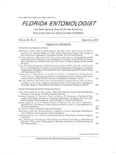
FLORIDA ENTOMOLOGIST
Scope & Guideline
Illuminating the Path of Insect Science and Ecology
Introduction
Aims and Scopes
- Ecological Interactions and Biodiversity:
Research on ecological relationships between insects and their environments, focusing on biodiversity, community dynamics, and the role of insects in ecosystems. - Insect Behavior and Physiology:
Studies investigating the behavioral patterns and physiological mechanisms of insects, including feeding, reproduction, and responses to environmental factors. - Pest Management and Biological Control:
Research aimed at developing and improving methods for pest control, including the use of biological control agents, integrated pest management strategies, and the impact of various agricultural practices. - Invasive Species and Host Plant Interactions:
Examination of the impacts of invasive insect species on native ecosystems and agriculture, as well as the interactions between insects and their host plants. - Molecular and Genetic Studies:
Utilization of molecular techniques to study insect genetics, species identification, and the development of innovative approaches for pest management.
Trending and Emerging
- Sustainable and Organic Pest Management:
There is an increasing trend towards researching organic and sustainable pest management solutions, reflecting a shift in agricultural practices and consumer preferences for environmentally friendly options. - Impact of Climate Change on Insect Populations:
Emerging studies focus on how climate change affects insect behavior, distribution, and ecology, highlighting the need to understand these impacts in the context of pest management. - Insect-Microbe Interactions:
Research into the relationships between insects and their associated microbial communities is gaining traction, particularly in understanding biological control and pest resistance mechanisms. - Urban Entomology:
A growing interest in the study of insects in urban environments, addressing issues related to pest management, biodiversity, and the role of urban green spaces in supporting insect populations. - Technological Advances in Insect Monitoring:
The application of new technologies, such as molecular diagnostics and remote sensing, is becoming more prominent, allowing for improved monitoring and management of insect populations.
Declining or Waning
- Traditional Chemical Control Methods:
There is a noticeable decrease in studies exclusively focused on chemical insecticides, as research increasingly emphasizes integrated pest management and environmentally friendly alternatives. - General Insect Taxonomy:
Although still important, there appears to be a waning interest in broad taxonomic studies without an ecological or applied context, as more researchers focus on specific ecological interactions or pest management applications. - Broader Agricultural Practices:
Research specifically on traditional agricultural practices is becoming less common, with a shift towards studies that address sustainable practices and their ecological implications.
Similar Journals

ENVIRONMENTAL ENTOMOLOGY
Advancing the Science of Insects and Their EnvironmentsENVIRONMENTAL ENTOMOLOGY, published by Oxford University Press, is a premier academic journal dedicated to advancing the field of entomology through the lens of environmental science. With the ISSN 0046-225X and E-ISSN 1938-2936, this journal has been a pivotal platform since its inception in 1973, currently converging until 2024. Recognized within the Q2 and Q1 category quartiles, it holds a prominent position, ranking 41st in Insect Science and 225th in Ecology, Evolution, Behavior and Systematics, showcasing its impact and relevance in the scientific community. The journal encompasses a broad scope, covering critical topics related to the interplay of insects and their environments, making it an essential resource for researchers, professionals, and students interested in ecological dynamics and insect biology. Although it does not provide open access, the research published here is vital for those striving to enhance their understanding of ecological systems and the vital roles insects play therein.
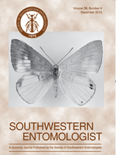
SOUTHWESTERN ENTOMOLOGIST
Fostering Collaboration in Insect Research and EcologySOUTHWESTERN ENTOMOLOGIST is a pivotal academic journal dedicated to advancing the fields of Agronomy, Ecology, and Insect Science. Published by the SOUTHWESTERN ENTOMOLOGICAL SOC in the United States, this journal plays a crucial role in disseminating vital research findings that address pressing ecological and agricultural challenges. With its ISSN 0147-1724 and E-ISSN 2162-2647, the journal has been publishing comprehensive studies since 1993 and continues to contribute significantly to the knowledge base up to 2024. As a Q4 ranked journal in both Agronomy and Crop Science and Ecology, as well as Insect Science, it provides an inclusive platform for researchers and students to share their insights and foster collaborations. Although it currently does not offer open access options, the content is accessible to academic institutions and professionals, ensuring that significant findings reach a broad audience. Given its niche focus, SOUTHWESTERN ENTOMOLOGIST not only appeals to researchers and students but also to professionals looking to stay updated on the latest trends and developments in entomology and its related fields.
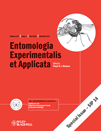
ENTOMOLOGIA EXPERIMENTALIS ET APPLICATA
Exploring the frontiers of entomological knowledge.ENTOMOLOGIA EXPERIMENTALIS ET APPLICATA is a premier journal dedicated to advancing the understanding of insect science through innovative research and thorough experimental methodologies. Published by Wiley, this esteemed journal has been at the forefront of entomology since its inception in 1958, with its latest convergence extending until 2024. With a commendable Impact Factor and categorically positioned in the Q2 quartile across both Ecology, Evolution, Behavior and Systematics and Insect Science fields, it plays a pivotal role in the dissemination of critical findings. The journal is indexed in Scopus, ranking 43rd out of 181 in Insect Science, showcasing its relevance and stature within the academic community, while maintaining a robust visibility among scholars. Given its rigorous peer-review process and a commitment to quality and innovation, ENTOMOLOGIA EXPERIMENTALIS ET APPLICATA serves as a vital resource for researchers, professionals, and students aiming to deepen their insights into entomological research.
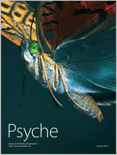
Psyche-A Journal of Entomology
Fostering Innovation in Entomology ResearchPsyche-A Journal of Entomology is a distinguished open-access journal published by Hindawi Ltd, specializing in the field of entomology, including aspects of ecology, evolution, behavior, and systematics of insects. Established in 1874, this journal has a rich history of contributing to the scientific community by disseminating high-quality research related to insects and their diverse interactions within ecosystems. With an impact factor placing it in Q3 for both Ecology, Evolution, Behavior and Systematics and Insect Science, Psyche serves as a pivotal platform for researchers, professionals, and students aiming to deepen their understanding of insect-related science. The journal's commitment to open access ensures that research is accessible to a global audience, promoting collaboration and innovation in entomological studies. Covering a broad timeline of converged years from 1874 to 2024, Psyche fosters a comprehensive dialogue around insect biodiversity, conservation, and the ever-evolving dynamics of ecosystems in which insects play crucial roles.

JOURNAL OF INSECT SCIENCE
Championing Open Access in Insect ScienceJOURNAL OF INSECT SCIENCE, published by OXFORD UNIV PRESS INC, stands as a pivotal platform in the field of insect science, offering open-access research since 2001. With an impactful presence in the academic community, this journal spans the convergence of entomology and various interdisciplinary studies, establishing itself in the Q2 quartile for both Insect Science and Medicine (miscellaneous) categories as of 2023. This esteemed journal is recognized for its contributions to the understanding and management of insect biology, ecology, and their implications for agriculture and human health, garnering a Scopus rank of 44 out of 181 in Agricultural and Biological Sciences. The Open Access model encourages wide dissemination of knowledge, making the rich repository of research accessible to a global audience. With ongoing publications until 2024, JOURNAL OF INSECT SCIENCE serves as an essential resource for researchers, professionals, and students seeking to deepen their understanding of the crucial role insects play in our ecosystem.
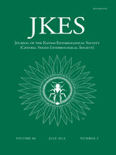
JOURNAL OF THE KANSAS ENTOMOLOGICAL SOCIETY
Exploring the Intricacies of Insect ScienceJOURNAL OF THE KANSAS ENTOMOLOGICAL SOCIETY, published by the Kansas Entomological Society, serves as a vital platform dedicated to the field of entomology and insect science. With an ISSN of 0022-8567 and an E-ISSN of 1937-2353, this journal has established itself since its inception in 1994, continuing to contribute valuable research up to 2024. Despite its current Q4 categorization in the 2023 Insect Science rankings, it ranks 106 out of 181 in Scopus, representing a significant opportunity for researchers to disseminate their findings in a supportive and engaged community. Although it is not an open-access journal, its commitment to rigorous peer review and relevance in agricultural and biological sciences makes it an essential resource for professionals, scholars, and students alike. The journal's focus on local and regional entomological issues often addresses broader ecological impacts, showcasing the importance of insects in environmental health and agriculture. We invite you to explore the rich tapestry of findings and discussions within this esteemed publication.

Annual Review of Entomology
Synthesizing Expertise for Future DiscoveriesAnnual Review of Entomology, published by Annual Reviews, is a premier journal dedicated to advancing the understanding of entomology through comprehensive review articles from leaders in the field. With a focus on Ecology, Evolution, Behavior, and Systematics and Insect Science, the journal ranks in the top quartile (Q1) as of 2023, reflecting its significant impact and relevance in these disciplines. Based in the United States, the Annual Review of Entomology has been a trusted resource since its inception, providing critical insights that inform research, policy, and education in entomology. Researchers and professionals will find valuable reviews that synthesize current knowledge and highlight future directions in insect research. The journal's impressive standing, as indicated by its rankings—first in both Agricultural and Biological Sciences categories—emphasizes its pivotal role in shaping scientific discourse and innovation.

APPLIED ENTOMOLOGY AND ZOOLOGY
Championing the study of insects for ecological balance.Applied Entomology and Zoology, published by Springer Japan KK, is a pivotal journal in the field of insect science, with an impressive track record since its inception in 1966. This esteemed publication, bearing ISSN 0003-6862 and E-ISSN 1347-605X, contributes significantly to the understanding of applied entomology, emphasizing research that supports sustainable agricultural practices and the ecological conservation of insects. Ranked in the Q2 category (2023) for Insect Science with a Scopus rank of #65 out of 181, it is recognized for its rigorous peer-review process and high-quality contributions that push the boundaries of our knowledge. Although it does not currently offer open access, the journal remains an essential resource for researchers, professionals, and students eager to advance their understanding of the complex interactions between insects and their environment. With a focus on practical applications, it aims to bridge the gap between entomological research and real-world implications, fostering innovation and promoting informed decision-making within the scientific community.
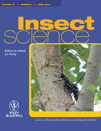
Insect Science
Exploring the intricate roles of insects in agriculture and ecology.Insect Science, published by WILEY, stands as a prestigious journal in the realms of Agronomy, Biochemistry, Genetics, and Insect Ecology. The journal, with ISSN 1672-9609 and E-ISSN 1744-7917, has firmly established itself as a significant resource for researchers and professionals seeking to explore the intricate dynamics of insects and their crucial roles in ecosystems. With a remarkable impact factor placing it in the Q1 quartile across multiple categories, including Ecology and Evolution and Agronomy and Crop Science, Insect Science ranks impressively at #8 out of 181 in the realm of Insect Science on Scopus, showcasing its influence and relevance in the field. Spanning its coverage from 1994 to 2024, this journal invites contributions that advance our understanding of insect biology, behavior, and their interactions within agricultural contexts. The commitment to high-quality research and its role in fostering interdisciplinary dialogue make Insect Science an essential platform for scholars and practitioners at the forefront of insect-related studies.

TURKIYE ENTOMOLOJI DERGISI-TURKISH JOURNAL OF ENTOMOLOGY
Connecting Science and Agriculture through EntomologyTURKIYE ENTOMOLOJI DERGISI - TURKISH JOURNAL OF ENTOMOLOGY is a distinguished journal published by the Entomological Society of Turkey in collaboration with Ege University, dedicated to advancing the field of insect sciences. With an ISSN of 1010-6960 and E-ISSN 2536-491X, this journal plays a pivotal role in disseminating groundbreaking research in entomology, particularly focusing on the diverse aspects of insect biology, ecology, and their applications in agriculture. As a member of the Q3 category in Insect Science according to the 2023 quartiles, it ranks in the 40th percentile of its field, indicating its growing influence and importance within the scientific community. The journal's scope encompasses innovative research findings, reviews, and short communications that contribute to the understanding and management of insect species. While not currently open access, it serves as a vital resource for researchers, professionals, and students seeking to stay informed about the latest developments in entomology from Turkey and beyond, with a commitment to maintaining high scholarly standards through rigorous peer review processes.